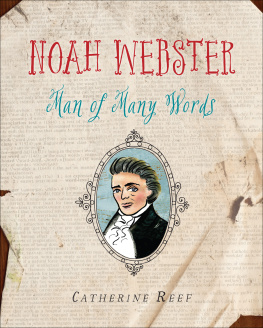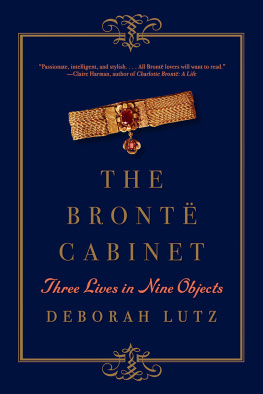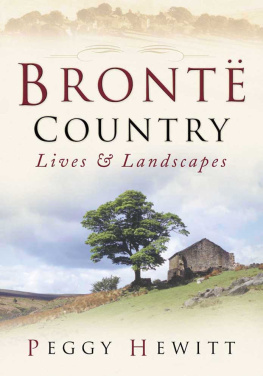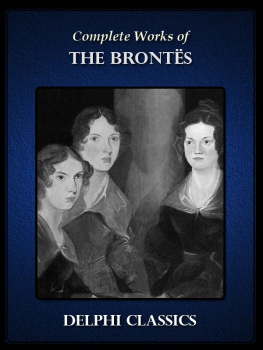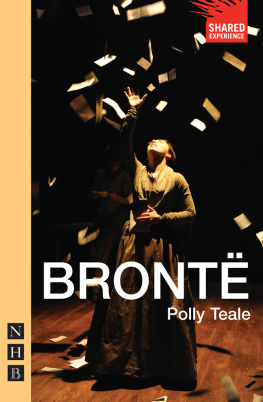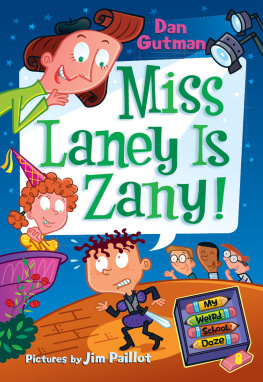Juliet Gael - Romancing Miss Brontë
Here you can read online Juliet Gael - Romancing Miss Brontë full text of the book (entire story) in english for free. Download pdf and epub, get meaning, cover and reviews about this ebook. year: 2010, publisher: Random House Publishing Group, genre: Art. Description of the work, (preface) as well as reviews are available. Best literature library LitArk.com created for fans of good reading and offers a wide selection of genres:
Romance novel
Science fiction
Adventure
Detective
Science
History
Home and family
Prose
Art
Politics
Computer
Non-fiction
Religion
Business
Children
Humor
Choose a favorite category and find really read worthwhile books. Enjoy immersion in the world of imagination, feel the emotions of the characters or learn something new for yourself, make an fascinating discovery.

- Book:Romancing Miss Brontë
- Author:
- Publisher:Random House Publishing Group
- Genre:
- Year:2010
- Rating:3 / 5
- Favourites:Add to favourites
- Your mark:
- 60
- 1
- 2
- 3
- 4
- 5
Romancing Miss Brontë: summary, description and annotation
We offer to read an annotation, description, summary or preface (depends on what the author of the book "Romancing Miss Brontë" wrote himself). If you haven't found the necessary information about the book — write in the comments, we will try to find it.
Romancing Miss Brontë — read online for free the complete book (whole text) full work
Below is the text of the book, divided by pages. System saving the place of the last page read, allows you to conveniently read the book "Romancing Miss Brontë" online for free, without having to search again every time where you left off. Put a bookmark, and you can go to the page where you finished reading at any time.
Font size:
Interval:
Bookmark:
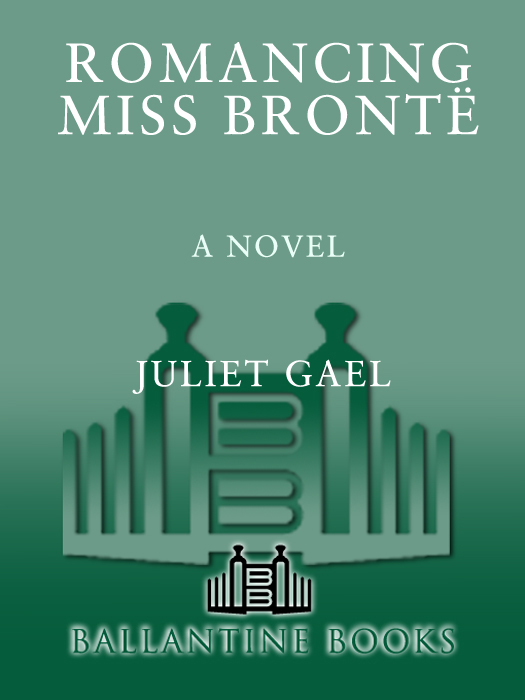
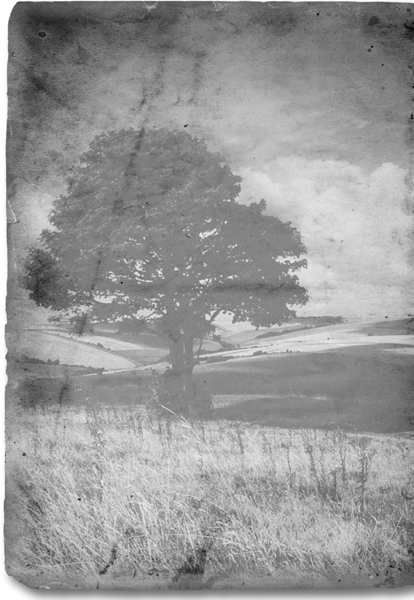
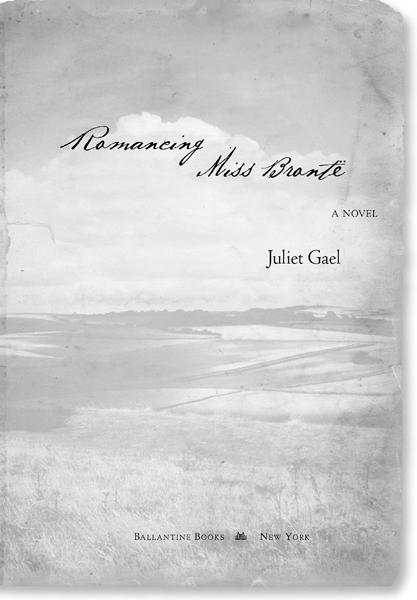
A mia cara, Ursula Terrasi
Certainly, at some hour, though perhaps not your hour, the waiting waters will stir; in some shape, though perhaps not the shape you dreamed, which your heart loved, and for which it bled, the healing herald will descend.
Charlotte Bront, Villette
H e rode in on the back of a wagon loaded with crates of chickens and bales of hay, driven by a brutish farmer who had not uttered a word throughout the journey except to curse his horse. Arthur would have enjoyed a bit of conversation as the wagon lurched along the muddy ruts, but the natural world was a thing of splendor and inspiration to him, and he was content to gaze upon the vistas opening up before his eyes. It was September and the wind was balmy and thick-scented with heather. Each climb to the brow of a hill revealed rise after rise carpeted in swirls of purple, green, and gold, each growing paler until the moors faded into a violet haze, and thereafter only shelves of mist the color of blush that might be land or might be clouds. The upper reaches of the River Worth flowed from these hills and fed the becks that fed the mills that fed the people, when times were good.
Arthur and the Church of England had been an arranged marriage of sorts, but he had been one of those fortunate few who had fallen deeply in love with his bride despite her many foibles and warts. He had no tolerance for those who sought to strip her of her liturgy and beauty, and undermine her authority. He was a proud young man, conscious of the dignity vested in him as the newly appointed curate to Haworth, so it was understandable that he was a little vexed to be arriving in the village atop a bale of hay in a lowly wagon full of chickens. There was something unsavory about it, a hint of degradation. He meditated on Christs entry into Jerusalem on the back of a donkey but could not reconcile this image with the squawking birds all around him. He wished he had a horse, but a horse was not within his means.
By the time they arrived at the bottom of Main Street the sky had darkened and lead-gray clouds were moving up swiftly from the south. The wind rose. Workers from the outlying mills were returning home across the fields, hurrying down to the village and disappearing into the dense, hidden warrens of the poor.
At the tollgate the farmer ordered him down. Ill deliver yer box but ye walk from ere, he muttered as he swiftly pocketed the coin Arthur dropped into his hand.
Where might I find the parsonage? Arthur asked stiffly. I am Reverend Bronts new curate.
For this bit of introduction all he got was a scowl and a sharp jerk of the head indicating the top of the steep hill.
A cold drizzle had blown in, sharp as needles.
The street was a long, brutal climb, and several times he threw an anxious glance over his shoulder at the old mare laboring slowly up the steep cobbled way. To the right the hillside fell off sharply, with ramshackle sheds and small garden plots scattered along the slope below. On the left rose a straggling row of small stone cottages built from millstone grit quarried in those treeless moors. A sense of oppression and harshness hung over the village.
Halfway up, Arthur paused to rest. Glancing back down the hill he saw that the horse had stalled and the farmer had resorted to a whip. Arthur was accustomed to dealing with recalcitrant draft horses, and he had a winning way with stubborn beasts, a talent that did not always translate to his own species. So when he turned back down the hill, it was more out of sympathy for the horse than for the brutish farmer. Drawing close, he could see the panic in the horses eyes and the strain that rippled along her muscled flanks. Arthur had once witnessed the carnage when a horse hitched to an overloaded wagon had been dragged backward down an icy slope, and he knew the animal had reason to fear. Arthur stepped up beside the horse and spoke soothingly to her, but when he reached for the bridle he was startled by the crack of the whip just over his head.
Away with ye, the farmer shouted. Git away. Git yer hands off my horse. Without warning he lashed out again with the whip, barely missing Arthurs cheek.
Arthurs eyes flashed with anger. He was a powerful man, with a good height and an oxlike build. He had it in him to drag the farmer from his seat and give him a thrashing, but his only concern was for the safety of the horse. He steeled his mind to the task and ignored the cursing, the whip, and the rain. With a firm, coaxing voice, he spoke to the beast, and after a moment she began to move.
Arthur stubbornly led the animal to the top, never relinquishing the reins until they reached a junction at the heart of the village where the road widened and leveled.
The farmer pulled his cap down around his head and waited in sullen silence while Arthur unloaded his trunk from between the bale of hay and crates of chickens. Without so much as a nod of gratitude, the man took up the reins and drove away.
Arthur looked around and found himself in front of the Black Bull Inn. Just a few feet away, up wide steps and through a gate stood the parish church: an ugly, dreary edifice, hardly more inspiring than the gloomy village that lay at its feet.
It was a disappointing revelation, but he was not the kind to ponder disappointments.
At the Black Bull he got a civil reply to his inquiry and learned that his lodgings were just up the lane. He arranged to have his trunk delivered and then set off up the cobbled street.
Past the church, the graveyard came into view. It spread up the treeless slope, climbing to the very walls of the parsonage and spilling into the fields beyond, an insidious thing that swelled its stomach with every harsh winter, famine, and plague. The parsonage stood alone at the top of the steep hill, anchored firmly in this sea of dead. Beyond lay the vast stormy sky and the wild moors.
The house was a two-storied Georgian thing, brick with a pair of whitewashed columns flanking the door. Respectable and unexceptional in any way.
Daylight was waning and Arthur was rain-soaked and out of temper, but he was curious about the aging reverend who had written him such elaborately courteous letters in an old-fashioned, grandiloquent sort of language. Patrick Bront was an Irishman, like himself, and Arthur had hoped to come to the end of his journey and find a little bit of home. A bit of Irish humor, and perhaps a glass of whiskey or port to revive his flagging spirits.
He hesitated at the bottom of the graveyard, nearly blown back by a stinging gust of wind. At that moment a woman appeared at the lower window of the parsonage. She held a candle that cast a warm light across her face, and she paused to peer out at the evening sky. After a moment, the shutters were drawn. One by one, upstairs and down, she appeared at the windows until the house was closed to the world.
At that moment a sudden, agonizing wail poured from the house. It sounded only briefly before being carried off by the wind as it swept, lamenting, past the sharp corners of the parsonage and out to the open moors, where there was nothing to impede its passage.
But Arthur was convinced it was not the wind he had heard.
Font size:
Interval:
Bookmark:
Similar books «Romancing Miss Brontë»
Look at similar books to Romancing Miss Brontë. We have selected literature similar in name and meaning in the hope of providing readers with more options to find new, interesting, not yet read works.
Discussion, reviews of the book Romancing Miss Brontë and just readers' own opinions. Leave your comments, write what you think about the work, its meaning or the main characters. Specify what exactly you liked and what you didn't like, and why you think so.


